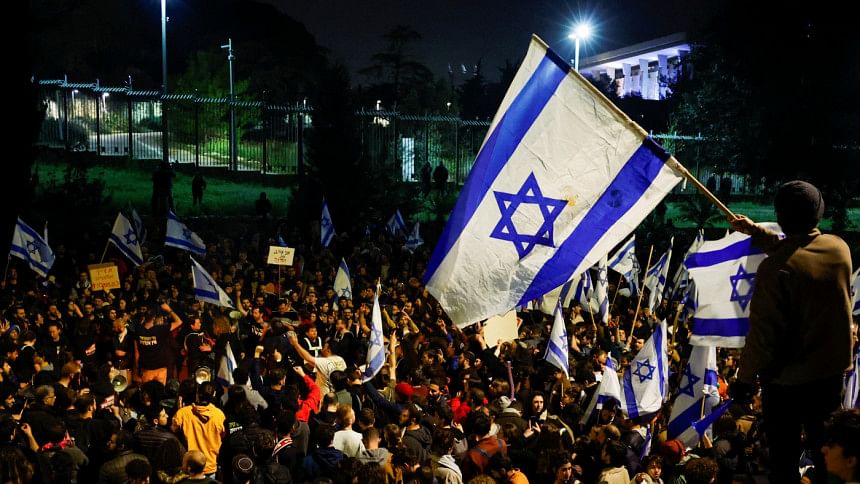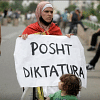Israel’s moment of reckoning is long overdue

In early August, Israeli settlers killed Qosai Mi'tan, a 19-year-old Palestinian from the West Bank village of Burqa. One of the suspects, Elisha Yered, is a right-wing extremist who until recently served as a spokesperson for Limor Son Har-Melech, a lawmaker from the far-right Otzma Yehudit (Jewish Power) party – a key member of Prime Minister Binyamin Netanyahu's governing coalition.
Despite Yered's current status as a murder suspect, the Israeli far-right has rallied behind him. Otzma Yehudit leader Itamar Ben-Gvir, who as National Security Minister is in charge of the police investigation into the shooting, lauded the suspects as "heroes."
The killing of Mi'tan, along with the settler riots in the West Bank village of Hawara in February, highlights the forces driving Netanyahu's coalition. While international observers often view the government's emasculation of Israel's judiciary as Netanyahu's bid to escape his ongoing corruption trial, his extremist allies are steering the government's agenda.
Netanyahu's far-right partners openly endorse Jewish supremacy and domestic terrorism. They proudly align themselves with the late rabbi and former Knesset member Meir Kahane, who called for the expulsion of Palestinians from the occupied territories and whose radical proposals were once compared by a prominent member of Likud – Netanyahu's own party – to the 1935 Nuremberg Laws.
These Jewish supremacists are largely indifferent to Netanyahu's legal troubles. In their view, Netanyahu is merely a useful idiot helping them to remove the few remaining obstacles to settlement expansion and intensification of military action against Palestinians. Their primary goal is to annex the West Bank.
Many far-right legislators openly express these sentiments. Simcha Rothman, chair of the Knesset's Constitution, Law, and Justice Committee who has played a key role in advancing the judicial coup, is a settler whose home in Pnei Kedem faces potential demolition over illegal construction. Minister of Finance Bezalel Smotrich, who also oversees the Civil Administration, the body governing civilian life in the occupied territories, is also a settler and a lifelong annexation advocate.
In 2017, Smotrich unveiled his so-called "decisive plan" for the full annexation of the West Bank, under which Palestinians would be denied voting rights, and those who object would face deportation. Smotrich acknowledged that his proposal might lead to a "democratic deficit," but rationalised formal apartheid as a necessary sacrifice.
Not very long ago, these politicians were fringe figures. For years, Otzma Yehudit was a marginal party, unable to win even one parliamentary seat. It was Netanyahu who persuaded the party to form an alliance with Smotrich's Religious Zionism ahead of the 2022 election, enabling the joint list to win 14 seats (out of 120).
But "fringe" fails to capture the broader context. In reality, there is little (if any) difference between these racist parties' stances and those of Netanyahu's Likud. Consider, for example, Justice Minister Yariv Levin (Likud), the judicial coup's architect. Levin has endorsed multiple proposals to "apply sovereignty" – a euphemism for annexation – to the occupied territories. In explaining his eagerness to push the coup, every example he gave concerned maintaining Israeli occupation.
Israel's autocratic drift is inextricably tied to the occupation. The ongoing judicial coup reflects not just the determination of a power-hungry leader to evade legal scrutiny but also a settler-driven effort to establish an apartheid regime between the Jordan River and the Mediterranean. And it is the occupation that has also facilitated the meteoric rise of previously peripheral figures such as Ben-Gvir and Smotrich.
The 2022 election is a case in point. Israel was still reeling from the wave of violence between Jews and Arabs that erupted in May 2021. The unrest began with the eviction of Palestinian residents from Sheikh Jarrah in East Jerusalem and quickly escalated into Operation Guardian of the Walls in Gaza, resulting in hundreds of deaths and sparking riots across Israel's mixed cities. Deeply shocked by the scale of the violence, many Israelis found themselves particularly receptive to Ben-Gvir's promises to "show the Arabs who is really in charge."
But Ben-Gvir's rhetoric also resonated because "conflict management" has long been Israel's preferred national-security approach. According to this logic, given that peace with the Palestinians is unattainable, maintaining the status quo is Israel's best option. For years, Israelis were indifferent to this strategic shift away from the peace process, largely because it was the Palestinians who bore the brunt of it. But trying to manage a conflict is like trying to manage a wildfire; when the winds shift, the flames turn toward you.
That is precisely what happened in May 2021. Since most of Israel's opposition parties had come to avoid even acknowledging the Palestinians' existence, the only solutions on the table were those offered by the far right. While Smotrich's apartheid plan is childish, dangerous, and abhorrent, it provided Israelis with something most of the political establishment had ceased to offer: a potential solution.
For decades, Israel has tried to manage the conflict, only to be managed by it. Just as they learned to turn a blind eye to the horrors of occupation, many Israelis regarded Ben-Gvir as a mere provocateur, overlooking the dangerous implications of his Kahanist beliefs and admiration for figures like the Jewish terrorist and mass murderer Baruch Goldstein.
This is why the opposition to the Netanyahu-Ben-Gvir-Smotrich alliance must offer a coherent vision for resolving the Israeli-Palestinian conflict. Any political alternative – whether it originates from the Knesset, the massive pro-democracy protests that engulf Israel every Saturday, or the international community – must address the consequences of Israel's decades-long policies in the occupied territories.
As pro-occupation leaders become increasingly candid about its objectives, their opponents must articulate a clear strategy for the West Bank's illegal settlements and outposts – the epicenters of Jewish fascism – and the thousands of soldiers on the ground sent to uphold military law on a civilian population. Our strategy must, first and foremost, strive to end the occupation. As long as Israel insists on maintaining a military dictatorship in the West Bank, genuine democracy will be impossible.
Avner Gvaryahu is executive director of Breaking the Silence.
Copyright: Project Syndicate, 2023
www.project-syndicate.org

 For all latest news, follow The Daily Star's Google News channel.
For all latest news, follow The Daily Star's Google News channel. 








Comments